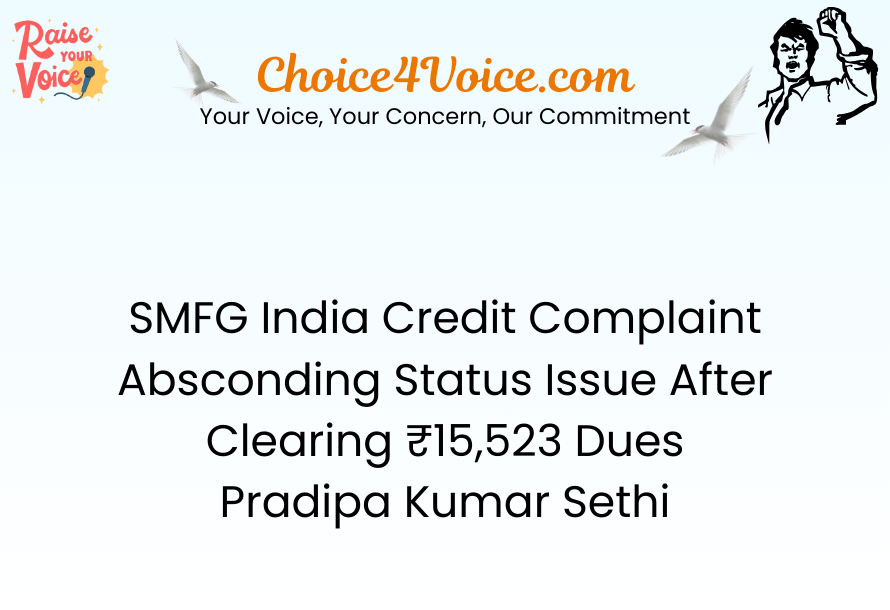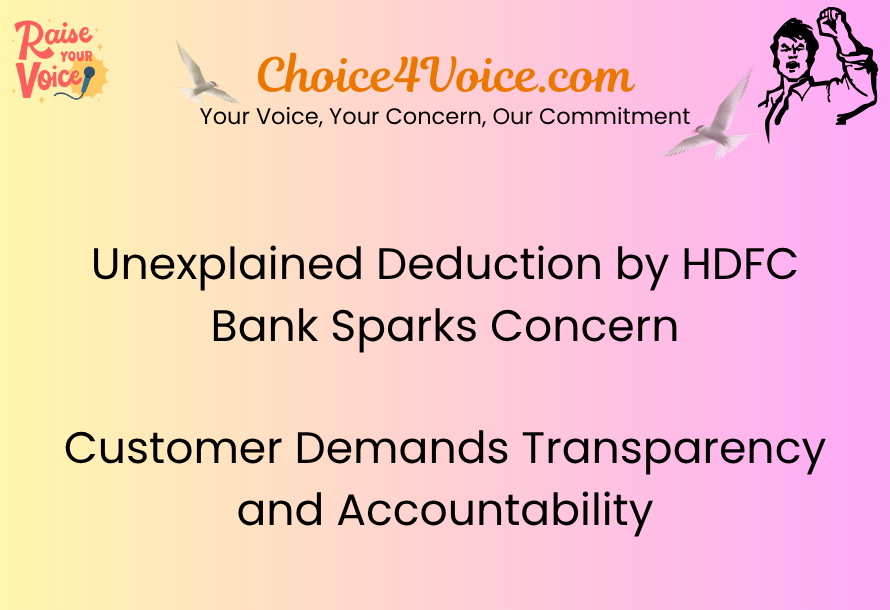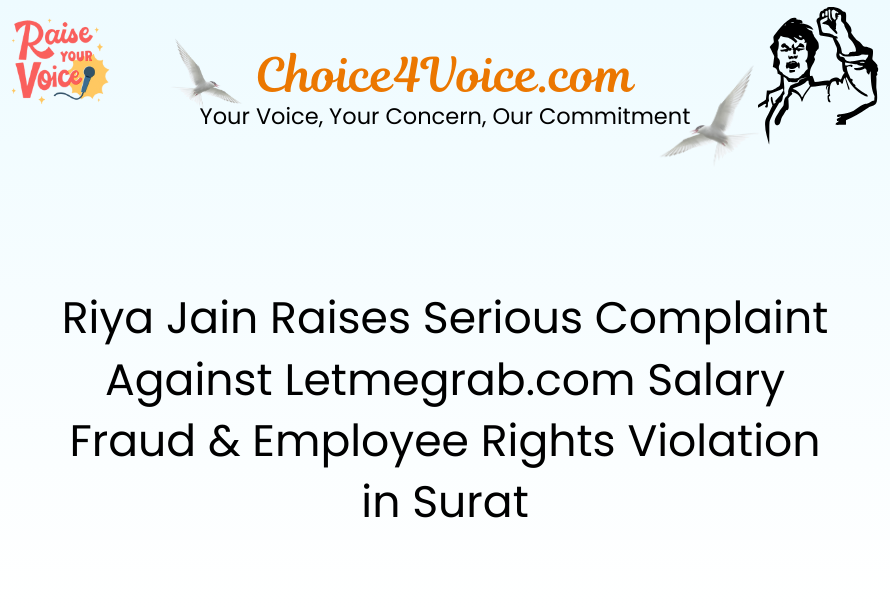If you’re experiencing this problem with this brand or any other company, submit your complaint and we may feature it on Choice4Voice.com.
Submit your complaint →Loan Officer Pradipa Kumar Sethi alleges SMFG India Credit refused to remove “absconding” status despite full payment of ₹15,523 dues. Read the full complaint, issues raised, and consumer rights at Choice4Voice.com
Note: If this issue is resolved, the concerned brand or the complainant may contact us at support@choice4voice.com. After proper verification, we will either update this article as “Resolved” or delete it, ensuring fairness to both parties.
Complaint Summary : SMFG India Credit Accused of Unethical Practice by Loan Officer Pradipa Kumar Sethi
| Field | Details |
|---|---|
| Complainant Name | Pradipa Kumar Sethi |
| Email ID | Not Provided |
| Complaint Type | Employment Harassment / Credit Record Issue |
| Company/Brand | SMFG India Credit |
| Position | Loan Officer |
| Dues Paid | ₹15,523 (equivalent to one month’s basic salary) |
| Issue Reported | Company refusing to remove “absconding” status even after clearance of all dues |
| Impact | Negative effect on credit score, job prospects, and personal credibility |
| Original Source | LinkedIn Post by Pradipa Kumar Sethi |
Full Complaint Write-Up
Pradipa Kumar Sethi, a Loan Officer at Tata Capital, has raised a serious grievance against SMFG India Credit, accusing the company of harassment and unethical conduct.
According to the complaint:
- The complainant had cleared all outstanding dues with SMFG India Credit.
- A payment of ₹15,523 (one month’s basic salary) was made as instructed by the HR department.
- Despite the clearance, the company has not removed the “absconding” status from his records.
- Multiple follow-ups through HR and company offices were made, but no corrective action was taken.
- The complainant alleges he was even threatened to delete his public posts highlighting the issue.
Impact on the Complainant
The refusal to update employment status has led to:
- Credit score damage
- Job opportunity restrictions
- Reputational harm
Mr. Sethi has described this as an act of harassment and character defamation, emphasizing that once dues are settled, there is no legal or ethical justification to continue labeling an employee as “absconding.”
Key Questions Raised
- Can a company legally maintain an “absconding” status after full and final settlement?
- What rights does an employee have in such situations?
- Should regulatory bodies intervene in cases of employment harassment linked to financial settlements?
Consumer Rights & Legal Perspective
Under Indian labor and employment practices:
- Once an employee settles dues, employers are obligated to provide clearance and update records.
- Retaining a false “absconding” status could amount to defamation, harassment, and wrongful conduct.
- Employees can approach:
- Labour Courts
- State Employment Authorities
- Consumer Forums (if linked with financial/credit harassment)
Choice4Voice.com’s View
Choice4Voice.com strongly condemns such unethical practices. Employers must ensure fairness and transparency in employee separation processes. Using “absconding” labels despite full settlement not only harms individuals but also violates professional ethics.
We encourage SMFG India Credit to:
- Immediately remove the false absconding status
- Issue a No Dues & Clearance Certificate
- Ensure employees are not threatened for raising genuine concerns
Frequently Asked Questions (FAQs)
Q1: What does “absconding” mean in employment records?
Absconding means an employee left without serving notice or following exit formalities. However, once dues are cleared, the status must be updated.
Q2: Can a company refuse to remove “absconding” even after full payment?
No, once the employee clears dues and complies, continuing to mark them as absconding is unethical and can be legally challenged.
Q3: What are the consequences of being marked absconding?
It can damage credit score, affect background verification, and harm career opportunities.
Q4: Can employees take legal action in such cases?
Yes. They can approach the Labour Court, file a defamation case, or seek help through consumer advocacy forums like Choice4Voice.com
Q5: What is the role of HR in final settlement cases?
HR must facilitate clearance, issue relieving letters, and ensure records are updated accurately.
Q6: Can posting such grievances on LinkedIn harm employees legally?
As long as the post is factual and not defamatory, employees have the right to share experiences publicly.
Q7: How can one protect their credit score from false reporting?
Employees can dispute incorrect records with credit bureaus like CIBIL, Equifax, Experian, and CRIF High Mark.
Q8: What documentation should employees keep in such disputes?
- Proof of dues paid (receipts)
- HR communications
- Emails/letters acknowledging settlement
Q9: Can threatening employees to delete public posts be considered harassment?
Yes. Threatening employees for voicing concerns can amount to workplace intimidation and harassment.
Q10: What steps can be taken if HR ignores repeated requests?
File a written complaint with higher authorities, escalate to labour commissioner, and seek legal recourse.
Q11: How long should a company take to update employment records?
Ideally within 30 days of final settlement.
Q12: Can absconding status affect future loans?
Yes. False records may impact creditworthiness and loan approvals.
Q13: What if an employer refuses to provide a relieving letter?
Employees can approach the labour court or escalate to regulators for resolution.
Q14: How can Choice4Voice.com help in such cases?
We publish verified complaints, create awareness, and put public pressure on companies to resolve consumer/employee issues.
Q15: Is it legal for a company to demand payment equivalent to one month’s salary at exit?
It depends on the employment contract. However, after payment, the employee must be given clearance.
Q16: Can employees demand compensation for reputational damage?
Yes, through civil defamation suits or labour tribunal claims.
Q17: Who regulates unfair HR practices in India?
Labour Ministry, Labour Commissioner, and courts.
Q18: Can social media posts help resolve such cases?
Yes, public awareness often compels companies to act faster.
Q19: What are the ethical duties of companies in employee separation?
- Transparency
- Fairness
- Timely updates
- Respectful treatment
Q20: What should future employers check before hiring?
They should validate with multiple references and not rely solely on a single employer’s exit status.
✅ If you are facing a similar issue, Choice4Voice.com is here to raise your complaint and ensure your voice is heard.
Choice4Voice.com Is Here to Help You
If you are facing a similar issue and would like our support in highlighting your concern, we are here to assist.
Simply write a LinkedIn post and tag our official page Choice4Voice.com
Submit your complaint directly : https://choice4voice.com/submit-your-complaint/
Our team will review and feature your case on our website to ensure it gets the attention it deserves.



